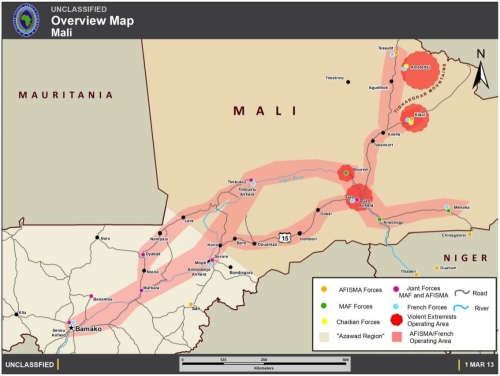France has been working steadily to establish and keep to a timetable for withdrawing the bulk of its forces from Mali and turn over responsibility to an African-led, UN-mandated peacekeeping force. Currently, the French plan is reduce the size of their contingent in Mali to around one thousand personnel by spring of next year. French forces are currently strained by a number of commitments, with forces being withdrawn from Kosovo as the country seeks to bolster its contingent in Central African Republic, where violence and lawlessness appear to be spiraling out of control.
However, as France attempts this disengagement it finds itself fielding criticism from the Mali government and others, as well as having to face the realities of a security situation that has no entirely stabilized. The situation in Mali has more accurately regressed in the second half of this year. The ethnic Tuareg rebel group the National Movement for the Liberation of Azawad (MNLA) said at the end of November that it was ending its ceasefire with the government. At the beginning of that month it had also been named among the groups working to form a new rebel coalition. The MNLA had previously been in coalition with Arab Islamist groups, but had effectively ended this partnership following the signature of an interim peace agreement with the Malian government in June.
The peace negotiations between the Tuaregs and the Malian government are at the core of the criticism of French policy in the country, with both sides accusing the French of being ineffectual in their efforts to help the two sides come to an agreement. French policy has indeed appeared to be at best complex. For instance, while French and Malian forces together wrested control of Kidal from rebels earlier in the year, the French also reportedly engaged with Tuaregs and the MNLA in operations against Islamist rebel groups. According to Malian authorities, the French also sought to create a buffer between the Malian government and the MNLA by looking to keep Malian security forces out of Kidal. Not only did this anger the Malian government, but also provided mixed signals to the MNLA, as France’s official policy was that the Tuaregs should drop their demands for autonomy and enter into negotiations with the central government.
Tensions between all three parties in Kidal, as well as elsewhere in the north, have been high. Two French journalists were kidnapped and killed last month and the Malian government’s response to recent Tuareg protests being at the core of their decision to end their ceasefire. In addition, the tensions come as Mali’s new government seeks to put the leader of the country’s 2012 coup and some of his associates on trial for various crimes including murder and kidnapping. Reports today say that investigators in the case against General Amadou Sanogo found a mass grave with twenty-one bodies in it near the southern garrison town of Kati. The bodies are believed to be those of so-called “red beret” soldiers, loyal to ousted President, who were then accused by then Captain Sanogo of plotting a counter-coup.
With all of this, as we now move into December it remains to be seen whether the French will have to extend their timetable for drawing down and ultimately withdrawing yet again.
